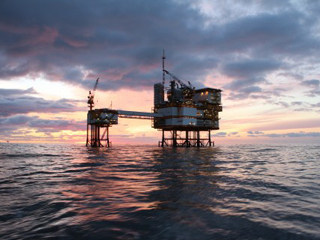
A new blueprint for oil & gas production on the UK Continental Shelf (UKCS) has been set out by the Wood Review, which maps out a new stewardship regime for the industry.
The report, issuedon 24 Feb, targets the recovery of an extra four billion barrels of oil equivalent - worth £200 billion - on the UKCS over the next 20 years.
Towards this goal, the UK government is to establish a new regulatory body to enforce greater co‐ordination of activities across the industry. This will include collaboration in areas such as exploration, third-party access to infrastructure, production efficiency and decommissioning.
A model for this approach is Norway's Exploration and Production Information Management (EPIM) association - a non-profit organisation governed by the operators on the Norwegian Continental Shelf.
Owned by 40 major oil companies, EPIM's remit is to facilitate IT-based solutions and services for the oil & gas industry through standardisation of requirements and processes.
Around 150 companies - authorities, contractors and suppliers - use the association's services. These are provides via a private Cloud-based system and include hubs dedicated to areas including environmental management, safety training, license administration, equipment information and logistics tracking.
These collaborative platforms improve the quality and flow of information, and lower costs for each individual operator, according to Ove Ryland, executive director of EPIM. They also, he said, introduce best-practice in life-cycle information management.
Moreover, these gains are being achieved "without impacting competition between companies or joint ventures or any reduction in information security," Ryland emphasised at the SMi E&P Information and Data Management conference in London on 12-13 Feb.
"[Collaboration] can be done, it has been done, and needs to be done to ensure a cost-effective and information management-efficient oil & gas industry," said Ryland.
The EPIM director concluded, though, by warning that "there is no point in collaboration and standardisation if you continue to do things the 'old' way or its not implemented properly across the organisations."
This level of industry-wide collaboration will, therefore, require new approaches to data-management at the oil & gas majors - as seen at Shell, which has recently formalised how information is processed throughout the organisation.
"The Shell data model is unambigious, system-agnostic, business-owned and is enabling our senior people to inform, discuss and articulate KPIs," Johan Stockman, an IT leader at Shell Global Solutions, said at the SMi conference in London.
At Shell, experienced, senior managers are now responsible for ensuring that the definitions in the data model actually reflect the requirements of their particular business area. They must, for example, specify what is meant by particular KPIs for well-injection performance, rather than assume that everyone will know what they mean.
"It all comes down to defining what you need," explained Stockman. "If you havn't thought this through, how are you going to have a successful application that you will be able to deploy?"
The increasing emphasis on data-management is closely linked to the digital oilfield concept in which IT and control and instrumentation technologies are combined within the enterprise data system. With their capacity to analyse large volumes of data, these systems give managers and engineers real-time access to engineering data and operational metrics.
The system is supported by production-level technologies as seen, for example, at Ithaca Energy (UK) Ltd, which is using a digitally enabled well performance monitor (WPM) from Honeywell Process Solutions (HPS) at its Athena oilfield in the UK North Sea.
Using WPM, Ithaca’s engineers can monitor how their wells are performing, while visual models predict what each well is capable of producing. Summary information and KPIs from real-time process data historians, production databases and engineering well models, allow operators to track field performance data and manage equipment assets.
The large flows of data generated by such digital oilfield systems is, meanwhile, increasing the need to connect offshore platforms with onshore bases via wireless and mobile networking and satellite communications.
According to a Deloitte report, these trends will drive demand for remote wireless sensors to monitor parameters such as temperature and pressure changes in the oilfield. The information, it notes, is increasingly being monitored by specialist engineering teams based at remote centres dedicated to tracking multiple offshore facilities.
Demand for such capabilities is driving M&A activity in the process control sector, as seen with Rockwell Automation's recently announced acquisition of vMonitor - owner of the world’s largest installed base of wireless wellhead monitoring systems, with more than 6,000 well sites.
The company’s technologies include an all-wireless portfolio of wellhead sensors and transmitters, remote terminal units, gateways and modems, as well as turn-key monitoring and control systems and services for oil & gas wells, pipelines, pumping and lift stations.
Some observers, though, believe the UK sector could do much more to leverage existing installed base of intelligent instruments. These already comprise the vast majority of the field devices employed in offshore oil and gas production fields.
According to figures from Emerson Process Management, up to 90% of the diagnostic data generated by this equipment is stranded in the field and never used. By integrating technologies that are in many cases already in place, production companies can utilise the diagnostic data acquired from smart field devices and digital valve controllers to improve operations and safety, the vendor believes.
Indeed, perhaps, the biggest lever for the digital oilfield and collaboration between operators on the UKCS will be the industry's commitment to safety - as defined by the many policies and practices adopted in the wake of the Deepwater Horizon disaster in the Gulf of Mexico.
This is acknowledged in the Wood report, which concludes: "Industry has achieved very successful collaboration on health & safety and there is no reason why this cannot work just as well in areas such as production efficiency, deployment of new technologies, shutdown co-ordination and a collaborative approach to decommissioning."
